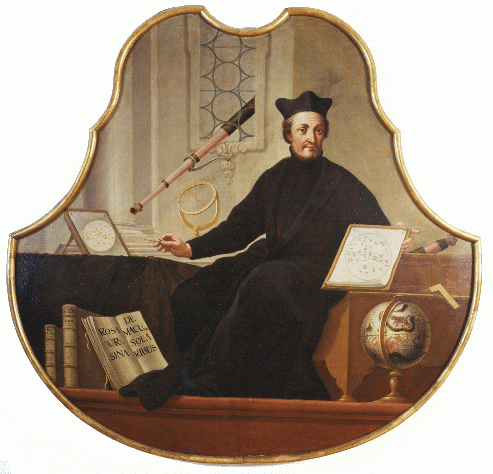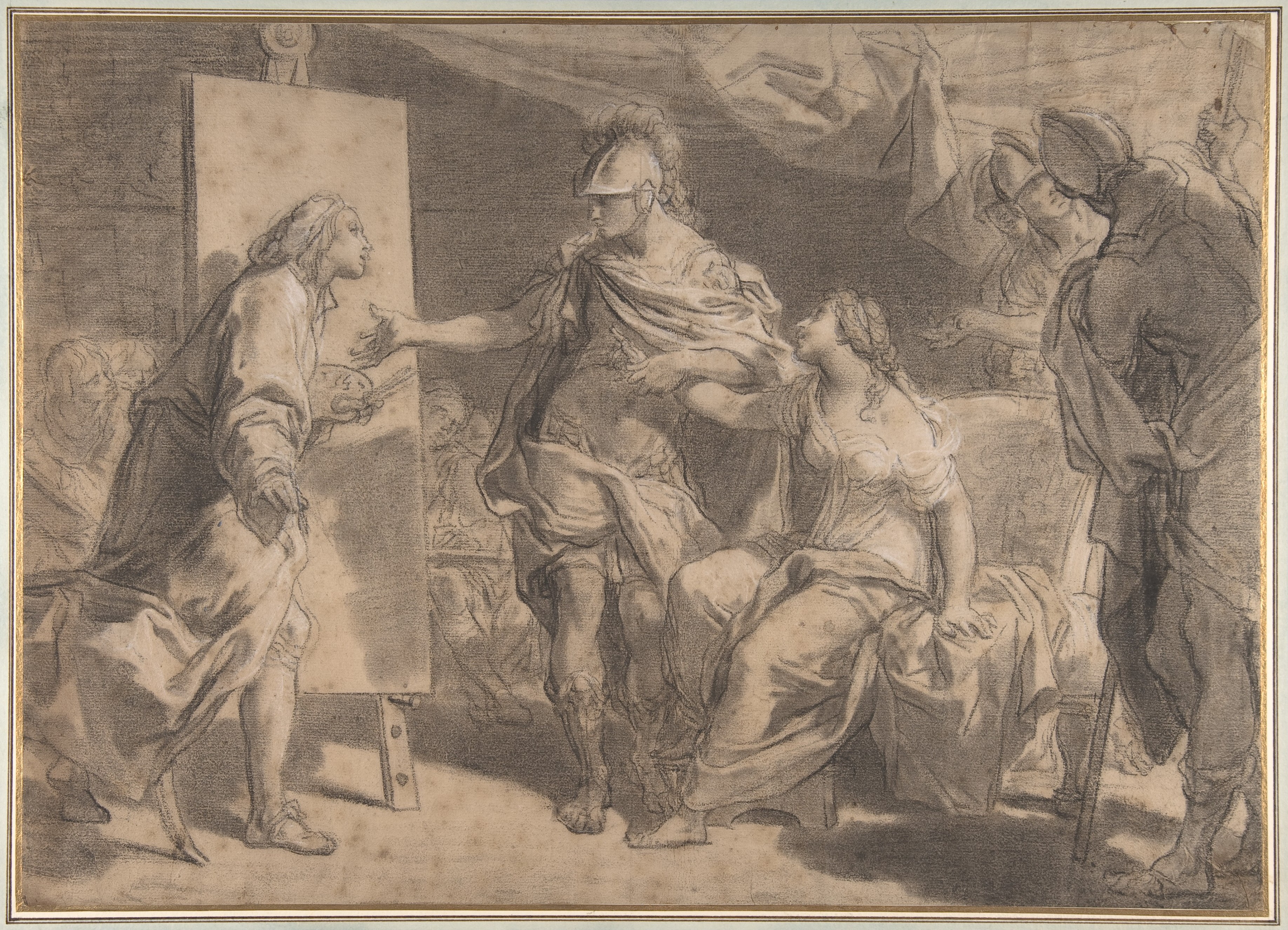|
Apelles (other)
Apelles was a painter of ancient Greece. Apelles may alsorefer to: * Apelles (gnostic), the founder of a Gnostic sect in the 2nd century *Apelles of Heraklion, one of the Seventy Disciples *"Apelles", a pseudonym used by Jesuit Christoph Scheiner in writing on sunspots *''Apelles'', a synonym for the butterfly genus ''Glaucopsyche'' * , an 1808 British Royal Navy ship * Matthäus Apelles von Löwenstern (1594–1648), German psalmist, musician and statesman [Baidu] |
Apelles
Apelles of Kos (; grc-gre, Ἀπελλῆς; fl. 4th century BC) was a renowned painter of ancient Greece. Pliny the Elder, to whom much of modern scholars' knowledge of this artist is owed (''Naturalis Historia'' 35.36.79–97 and ''passim''), rated him superior to preceding and subsequent artists. He dated Apelles to the 112th Olympiad (332–329 BC), possibly because he had produced a portrait of Alexander the Great. Biography Probably born at Colophon in Ionia, he first studied under Ephorus of Ephesus, but after he had attained some celebrity he became a student to Pamphilus at Sicyon He thus combined the Dorian thoroughness with the Ionic grace. Attracted to the court of Philip II, he painted him and the young Alexander with such success that he became the recognized court painter of Macedon, and his picture of Alexander holding a thunderbolt ranked in the minds of many with the Alexander with the spear of the sculptor Lysippus. Hundreds of years later, Plutar ... [...More Info...] [...Related Items...] OR: [Wikipedia] [Google] [Baidu] |
Apelles Of Heraklion
Apelles of Heraklion ( grc-gre, Ἀπελλῆς) is numbered among the Seventy Disciples. Along with the Apostles Urban of Macedonia, Stachys, Ampliatus, Narcissus of Athens and Aristobulus of Britannia (all of these names are mentioned together by St. Paul in , which cannot be casual) he assisted Saint Andrew. St. Apelles was bishop of Heraclea in Trachis. His feast day is October 31. Sources *St. Nikolai Velimirovic, ''The Prologue from Ohrid The ''Prologue from Ohrid'' was compiled by Saint Nikolai Velimirovic. Bishop Nikolai's work is a compilation of lives of saints, hymn A hymn is a type of song, and partially synonymous with devotional song, specifically written for the purpo ...'' External linksApostle Narcissus of the Seventy January 4 ( OCA)Apostle Narcissus of the Seventy October 31 (OCA) References * Seventy disciples 1st-century bishops in Roman Achaea 1st-century deaths Year of birth unknown {{saint-stub ... [...More Info...] [...Related Items...] OR: [Wikipedia] [Google] [Baidu] |
Christoph Scheiner
Christoph Scheiner SJ (25 July 1573 (or 1575) – 18 June 1650) was a Jesuit priest, physicist and astronomer in Ingolstadt. Biography Augsburg/Dillingen: 1591–1605 Scheiner was born in Markt Wald near Mindelheim in Swabia, earlier markgravate Burgau, possession of the House of Habsburg. He attended the Jesuit St. Salvator Grammar School in Augsburg from May 1591 until 24 October 1595. He graduated as a "rhetor" and entered the Jesuit Order in Landsberg am Lech on 26 October 1595. At the local seminary, he served his biennial novitiate (1595–1597) under the tutelage of Novice Master Father Rupert Reindl SJ. From 1597 to 1598, he finished his lower studies of rhetoric in Augsburg. He took his first vows before Father Melchior Stör, SJ and received the minor orders from the Augsburg suffragan bishop Sebastian Breuning. He spent the years 1598–1601 in Ingolstadt studying philosophy (metaphysics and mathematics). In 1603, Scheiner invented the pantograph, "Lake Cou ... [...More Info...] [...Related Items...] OR: [Wikipedia] [Google] [Baidu] |
Glaucopsyche
''Glaucopsyche'', commonly called blues, is a Holarctic genus of butterfly in the family Lycaenidae, found mainly in Palearctic Asia. For other species called "blues" see subfamily Polyommatinae and genus ''Plebejus''. SpeciesLepIndex: synonymic list for superfamily Papilionoidea family Lycaenidae; subfamily Polyommatinae * '' Glaucopsyche alexis'' (Poda, 1761) – green-underside blue * '' Glaucopsyche alluaudi'' Oberthür, 1922 Morocco may be ''Glaucopsyche melanops'' subspecies ''alluaudi'' * '' Glaucopsyche argali'' (Elwes, 1899) **''Glaucopsyche argali argali'' southeast Altai **''Glaucopsyche argali arkhar'' (Lukhtanov, 1990) Altai * '' Glaucopsyche arizonensis'' McDunnough, 1936 Arizona may be ''Glaucopsyche lygdamus'' subspecies ''arizonensis'' * '' Glaucopsyche astraea'' (Freyer, 1852) Asia Minor, Kurdistan * '' Glaucopsyche charybdis'' (Staudinger, 1886) Central Asia * '' Glaucopsyche damaetas'' (Denis & Schiffermüller, 1775) T.L. "neighbourhood of Vienna" * '' Glau ... [...More Info...] [...Related Items...] OR: [Wikipedia] [Google] [Baidu] |
Matthäus Apelles Von Löwenstern
Matthäus Apelles von Löwenstern (20 April 1594 – 11 April 1648) was a German psalmist, musician and statesman. Life He was born in Prudnik as Matthäus Apelt. His father was a saddler. He studied at the university of Frankfurt. He directed the music of the church at Prudnik. In 1625, he was named musical director and treasurer to Duke Heinrich Wenzel of Münsterberg. The following year, he became rector of a school, and in 1631, he was admitted to the Duke's government. He sat in the governments of Emperors Ferdinand II and Ferdinand III. He became part of the nobility of Ferdinand II, and this was confirmed by Ferdinand III. Löwenstern wrote thirty psalms, of which many were translated to other languages. He also published the psalm collection ''Früelings-Mayen'' in 1644. He has one psalm in the '' Norsk Salmebok'' and ''Norsk salmebok 2013 ''Norsk salmebok 2013: for kirke og hjem'' (Norwegian Hymnal 2013: For Church and Home; also known as ''N13'') is the hymnal of ... [...More Info...] [...Related Items...] OR: [Wikipedia] [Google] [Baidu] |
Aristophanes Of Byzantium
__NOTOC__ Aristophanes of Byzantium ( grc-gre, Ἀριστοφάνης ὁ Βυζάντιος ; BC) was a Hellenistic Greek scholar, critic and grammarian, particularly renowned for his work in Homeric scholarship, but also for work on other classical authors such as Pindar and Hesiod. Born in Byzantium about 257 BC, he soon moved to Alexandria and studied under Zenodotus, Callimachus, and Dionysius Iambus. He succeeded Eratosthenes as head librarian of the Library of Alexandria at the age of sixty. Work Aristophanes was the first to deny that the "Precepts of Chiron" was the work of Hesiod. Inventions Accent system Aristophanes is credited with the invention of the accent system used in Greek to designate pronunciation, as the tonal, pitched system of archaic and Classical Greek was giving way (or had given way) to the stress-based system of Koine. This was also a period when Greek, in the wake of Alexander's conquests, was beginning to act as a lingua franca for the ... [...More Info...] [...Related Items...] OR: [Wikipedia] [Google] [Baidu] |
Apelles (tutor)
Apelles of Kos (; grc-gre, Ἀπελλῆς; fl. 4th century BC) was a renowned painter of ancient Greece. Pliny the Elder, to whom much of modern scholars' knowledge of this artist is owed ('' Naturalis Historia'' 35.36.79–97 and ''passim''), rated him superior to preceding and subsequent artists. He dated Apelles to the 112th Olympiad (332–329 BC), possibly because he had produced a portrait of Alexander the Great. Biography Probably born at Colophon in Ionia, he first studied under Ephorus of Ephesus, but after he had attained some celebrity he became a student to Pamphilus at Sicyon He thus combined the Dorian thoroughness with the Ionic grace. Attracted to the court of Philip II, he painted him and the young Alexander with such success that he became the recognized court painter of Macedon, and his picture of Alexander holding a thunderbolt ranked in the minds of many with the Alexander with the spear of the sculptor Lysippus. Hundreds of years later, Plutarc ... [...More Info...] [...Related Items...] OR: [Wikipedia] [Google] [Baidu] |
Philip V Of Macedon
Philip V ( grc-gre, Φίλιππος ; 238–179 BC) was king ( Basileus) of Macedonia from 221 to 179 BC. Philip's reign was principally marked by an unsuccessful struggle with the emerging power of the Roman Republic. He would lead Macedon against Rome in the First and Second Macedonian Wars, losing the latter but allying with Rome in the Roman-Seleucid War towards the end of his reign. Early life Philip was the son of Demetrius II of Macedon and Chryseis. Philip was nine years old when his father died 229 BC. His elder paternal half sister was Apama III. Philips's great-uncle, Antigonus III Doson, administered the kingdom as regent until his death in 221 BC when Philip was seventeen years old. Philip was attractive and charismatic as a young man. A dashing and courageous warrior, he was compared to Alexander the Great and was nicknamed ''beloved of the Hellenes'' () because he became, as Polybius put it, "...the beloved of the Hellenes for his charitable inclination". A ... [...More Info...] [...Related Items...] OR: [Wikipedia] [Google] [Baidu] |
Demetrius (son Of Philip V)
Demetrius was the younger son of Philip V of Macedon, but his only son by his legitimate wife, the elder brother Perseus being the son of a concubine.Livius. xxxix. 53 After the Battle of Cynoscephalae, Philip was obliged to surrender Demetrius, then very young, to Titus Quinctius Flamininus as a hostage, and he was subsequently sent to Rome in that capacity. Five years afterwards he was honourably restored to his father, Philip having at this time obtained the favour of Rome by his services in the war against Antiochus the Great Antiochus III the Great (; grc-gre, Ἀντίoχoς Μέγας ; c. 2413 July 187 BC) was a Greek Hellenistic king and the 6th ruler of the Seleucid Empire, reigning from 222 to 187 BC. He ruled over the region of Syria and large parts of the r .... But this did not last long, and Philip, finding himself assailed on all sides by the machinations of Rome and her intrigues among his neighbours, determined to try to avert, or at least delay, the impend ... [...More Info...] [...Related Items...] OR: [Wikipedia] [Google] [Baidu] |
Caligula
Gaius Julius Caesar Augustus Germanicus (31 August 12 – 24 January 41), better known by his nickname Caligula (), was the third Roman emperor, ruling from 37 until his assassination in 41. He was the son of the popular Roman general Germanicus and Augustus' granddaughter Agrippina the Elder. Caligula was born into the first ruling family of the Roman Empire, conventionally known as the Julio-Claudian dynasty. Although Gaius was named after Julius Caesar, Gaius Julius Caesar, he acquired the nickname "Caligula" ("little ''caligae, caliga''," a type of military boot) from his father's soldiers during their campaign in Germania. When Germanicus died at Antioch in 19, Agrippina returned with her six children to Rome, where she became entangled in a bitter feud with Tiberius. The conflict eventually led to the destruction of her family, with Caligula as the sole male survivor. In 26, Tiberius withdrew from public life to the island of Capri, and in 31, Caligula joined him there. Fo ... [...More Info...] [...Related Items...] OR: [Wikipedia] [Google] [Baidu] |
Cassius Dio
Lucius Cassius Dio (), also known as Dio Cassius ( ), was a Roman historian and senator of maternal Greek origin. He published 80 volumes of the history on ancient Rome, beginning with the arrival of Aeneas in Italy. The volumes documented the subsequent founding of Rome (753 BC), the formation of the Republic (509 BC), and the creation of the Empire (27 BC), up until 229 AD. Written in Ancient Greek over 22 years, Dio's work covers approximately 1,000 years of history. Many of his 80 books have survived intact, or as fragments, providing modern scholars with a detailed perspective on Roman history. Biography Lucius Cassius Dio was the son of Cassius Apronianus, a Roman senator and member of the gens Cassia, who was born and raised at Nicaea in Bithynia. Byzantine tradition maintains that Dio's mother was the daughter or sister of the Greek orator and philosopher, Dio Chrysostom; however, this relationship has been disputed. Although Dio was a Roman citizen, he wrote in Gree ... [...More Info...] [...Related Items...] OR: [Wikipedia] [Google] [Baidu] |



